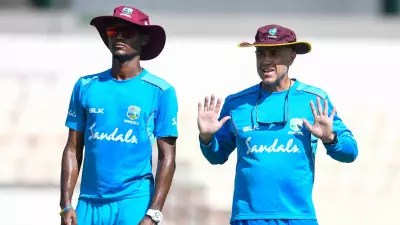
Shubman Gill's Neck Injury Casts Shadow Over Second Test Participation
Indian cricket captain Shubman Gill faces uncertainty ahead of the second Test against South Africa after suffering a neck injury during the opening match in Kolkata. The 26-year-old batsman was forced to retire hurt on Day 2 of the Test match at Eden Gardens after facing just three deliveries, casting concerns over his availability for the crucial Guwahati encounter.
Medical Assessment and Travel Plans
The Board of Control for Cricket in India (BCCI) has provided a crucial update on Gill's condition through an official press release. The skipper was taken to a local hospital following the conclusion of Day 2's play and underwent thorough medical examination. As a precautionary measure, medical authorities decided to keep him under observation overnight at the healthcare facility.
According to the BCCI statement, Gill was discharged the following day and has shown positive response to the medical treatment administered. The board confirmed that the Indian captain will travel with the team to Guwahati for the second Test, scheduled to begin shortly. However, his actual participation in the match remains undecided.
The BCCI medical team will continue monitoring Gill's recovery progress closely, with the final decision regarding his availability for the second Test to be made based on his physical condition in the coming days.
Heavy Workload Raises Concerns
Gill's injury has brought attention to the demanding schedule the young captain has maintained over recent months. Statistical analysis reveals that the 26-year-old has been playing continuous cricket across all three formats for nearly six months without significant breaks.
His grueling schedule began with the England Test series that ran from June to August, followed by his appointment as deputy to T20I skipper Suryakumar Yadav for the Asia Cup in UAE from September 9-28. The relentless cricket calendar continued with Gill returning to India to lead the national team in the two-match West Indies series from October 2-14.
Immediately after the Windies assignment, Gill embarked on a white-ball tour to Australia, featuring three ODIs and five T20Is that spanned from October 19 to November 8. This translates to approximately 48 days of active match time in the last five months, excluding the intense preparations for the ongoing South Africa series that commenced on November 14.
Gill's Own Assessment of Schedule Demands
The Indian captain had himself acknowledged the challenges of such a packed schedule during the pre-match press conference at Eden Gardens. Gill emphasized the mental and physical difficulties of adapting to different formats and conditions within short timeframes.
"I think in 4-5 days of turnaround, coming from another country and playing different formats is not easy. It's mentally more challenging," Gill stated. "There's a good amount of time difference between India and Australia. So, the body takes a bit of time to get used to it. Then after coming here, there's a different challenge of playing Test cricket in India as compared to playing white-ball cricket in Australia."
He further added, "Definitely, it's a bit challenging mentally and physically. But as a professional cricketer, it's about how you tackle these things."
The cricket fraternity now awaits the BCCI medical team's final decision on Gill's participation, with the Indian team management likely to consider both the player's immediate fitness and long-term workload management in their assessment.






